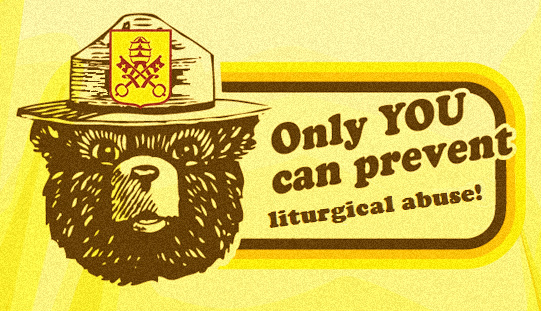Roman Catholic author William Bornhoft admits to cringing
at the liturgical novelties seen too often at Mass but this 24-year-old Minnesotan fears where that temptation can lead. In an essay he lamented the practice of "outing" these abuses in what has been termed “liturgy shaming” the offenders in social media. You can read his column at the Catholic website Aleteia
decide whether or not he has made his case. As one who sometimes outs the offenders on this blog, I am conflicted over this.
The truth is that I agree we should not delight in the practice of showing what is the worst among us on Sunday morning. My blog does not serve the primary interest of such liturgical abuses but does, occasionally, point them out because they are egregious and the people of God need to be warned that such novelties are not simply trivial but profoundly betray the solemn action of God in delivering to us His Son in the voice of the Word and the communion of His flesh and blood for the forgiveness of our sins.
As an attempt to explain those who "out" such liturgical abusers, I would point to the fact that most of these folks are powerless to do much to hinder such strange, novel, and trite abuses of the liturgy. Those who tattle on the abuses are often those who have already brought their complaints to those who plan and lead worship in their parishes and have found a deaf ear. They have complained and found their complaints ignored and dismissed. In their complaints and because they have found no other way to effect any serious review of these practices or means to end them, they have resorted to outing them. Perhaps this is done with too much delight. Perhaps we who watch them have snickered too much in watching the abuse. But most of them have sought not to harm the churches but to awaken the baptized to the way in which worship itself and God's gracious activity in worship is being betrayed and hindered by our cutsie quest for personal expression and popularity.
I know that I have complained about goofy practices and running monologues in place of the words of the Divine Service and jokes within the liturgy. And in most cases the people to whom I complained insist that I am taking it all too seriously. But that is the point. They are not taking seriously at all what happens in worship and the sacred work that God is doing in coming to us in Word and Sacrament to bestow upon us the fruits of Christ's redeeming work. The problem lies not with taking the Divine Service too seriously but in not taking it seriously at all. This is not simply something we do. It is God's service to us. He stands in our presence. Heaven has been placed in earthly time and space. Christ is here and gives Himself to us in the means of grace. We are in the presence of the Most High God whose delight it is to save and redeem us from our sins. The Holy Spirit is at work equipping us with repentance and faith so that we might respond to God's gracious activity with the good works of Him who called us from darkness into His marvelous Light.
Those who offend liturgical propriety suggest that the complainers are thin-skinned, quick tempered, and too full of themselves. Perhaps we are guilty of all of these. But there is no one more thin skinned than the pastor who sees his liturgical leadership as a spotlight on his personality, no one more quick tempered than the one who is told he is making about himself what ought to be about Christ, and no one more full of himself than the pastor who turns the liturgy into a comedy routine, who delights in shocking with vulgar speech in the sermon, and who competes with Christ for the central focus of the worship service.
No, it is not a good thing when we delight in outing offenders who make the liturgy trite or trivial, who exhibit great bad taste, and who act as if nothing important is really happening within the Divine Service. . . but it is an even worse thing when such things go on unchallenged.

2 comments:
Social Media has given everyone with a computer, IPad, or smartphone, a stage. I guess you could call it hyper-democracy. Sorting valid complaints from unreasonable ones becomes the sticky points when we are discussing "Liturgical outing." I think the Liturgy is very important, and it should be reverential and always part of worship. I wish in a way we could agree on more things than we, as Christians, often disagree, picking battles and skirmishes instead of collectively praising Jesus, Our Lord, and Savior.
Out every last scoundrel with vim and vigor...and a scatophagic grin. What they do is done in public, so there is no reason not to make it more public. You can't call it shaming, though, as that would imply a sense of shame where none has been manifested.
Post a Comment